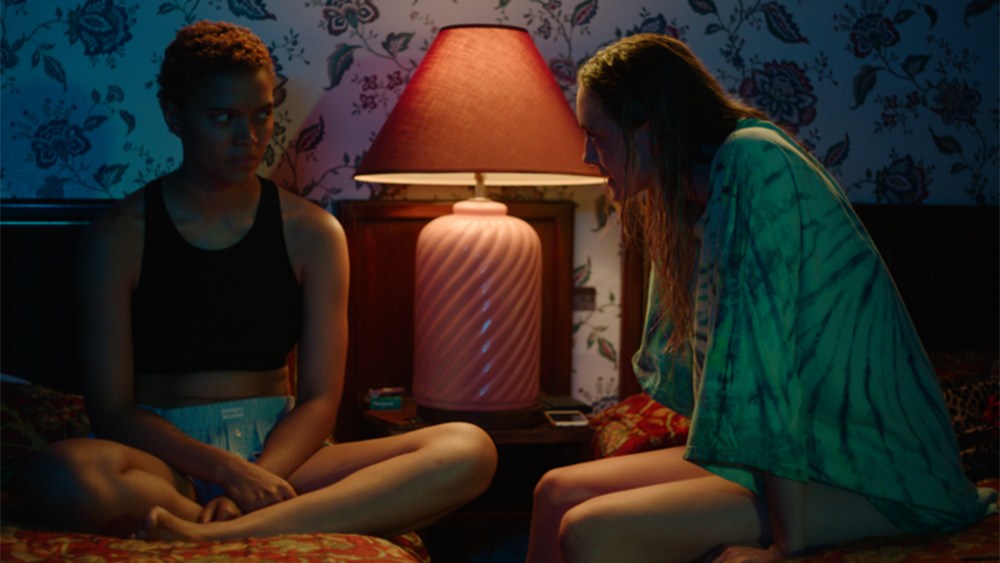In “Ride of Die,” things go sideways for its road trippers in a hurry. Paula and Sloane are barely out of St. Louis when they need a tow. The truck driver arrives with a twang. He’s unsavory and too leering for comfort. Matters aren’t helped any that minutes earlier, Paula had noticed something swinging from a tree in this stretch of rural blacktop.
It’s probably not fair to compare films that put two women on the road and under duress to the 1991 classic “Thelma & Louise,” but when that on-the-lam duo drove off a cliff and into icon status, the film all but guaranteed ghostly sightings. A recent descendent was Kitty Green’s “The Royal Hotel,” which sent two backpacking friends — a practical one and an impulsive one — into the Australian outback to work at a pub where sexual menace infuses the arid air.
Now, there’s Josalynn Smith’s debut feature, “Ride or Die,” premiering at Tribeca. Produced by Jamie Foxx’s production company, Foxxhole, the drama — or as it’s been described the “anti-romantic/thriller” or the queer “Thelma & Louise” — has flaws, but also suggests a young director intrigued by ideas, comfortable with understatement and at ease with actors. Briana Middleton as Paula, a cautious soul with cropped curly hair, and Stella Everett as Sloane, whose wild child has clearly been shaped by trauma, give dynamic performances. Their turns are bolstered by Arlene Muller’s in-their-faces cinematography and Olivia Eliseo’s editing.
The leading pair meet at a vintage clothing store in their hometown of St. Louis. Or rather, they meet again. Paula and Sloane went to the same high school. Working the register, Sloane of the septum piercing stuck around. Paula has returned from college back east and is living with her mother and stepfather. An aspiring filmmaker, she dreams of making her way to Los Angeles. Their vibe is sweetly friendly and tentatively flirtatious, which will turn into something more as they embark on an impulsive road trip.
If that sounds like a mildly personal set-up for a debut feature, Smith, who grew up in St. Louis and got her MFA at Columbia, has said as much. And one of the attractions of “Ride or Die,” written by Smith and Alicia Louzoun-Heisler, resides in the director’s nuanced knowledge of her protagonists. She knows that nascent love can be messy and myopic. The pair will make stupid decisions, and viewers will likely wonder: would a girl like Paula really do that for a mess like Sloane? The director knows the answer is, “Yeah, she would.” There’s a deep yearning and caring at work here that is the film’s idiosyncratic strength, but also may be its weakness, plausibility-wise.
Yes, these opposites attract but there’s more to their dynamic. Paula is Black, middle-class and loved by her mom, although she’s not understood, nor is her queerness honored. The church moors her family, even as it presses down on her joy and possibilities. Sloane hails from domestic upheaval. Though we never see her mother, an ill-timed phone call has Sloane arguing with her while sitting at the dinner table at Paula’s home. Paula’s mother (Eisa Davis), ever polite, looks suspicious and worried.
She should be. Within hours, the pair have hit the road in Paula’s old and gold Wagoneer. There are subtly observed moments in which Sloane’s whiteness, as compromised as her power is in the world, trumps Paula’s actual competence. A prickly confrontation with a down-and-out white woman in front of a convenience store sours their groove for a spell. That a scene soon after finds the two canoodling at an arthouse showing the perfect double bill of “Daughters of the Dust” and “Killer of Sheep,” is quietly funny — Sloane had just been riffing about what a blast “Jennifer’s Body” was — and maybe a bit sad too.
Fear not, there’s joy and friskiness here and a celebration of the type of connection that feels like love, though it will surely look like madness a few years down the road. Actor Guinevere Turner, who has a storied history with queer cinema having made her debut in “Go Fish,” slings drinks and stories at a girl bar in the mountain west where Paula actually gets a meet cute. A beauty bellies up for her usual, all smiles and shares the secret handshake of those raised in the Black church: “God is Good.” Paula doesn’t miss a beat. It’s a little Black magic in a film reckoning with something else.
That Sloane has a father in Arizona comes as a teasing subplot before it becomes a full-blown destination. The movie returns to where it had begun so provocatively with the pair out in the desert and Paula asking in voice-over, “How do you ask for forgiveness?”
Read the full article here


